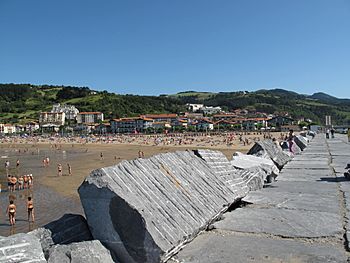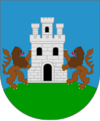Deba, Spain facts for kids
Quick facts for kids
Deba
|
||
|---|---|---|
|
Municipality
|
||

Deba beach
|
||
|
||
| Country | ||
| Autonomous Community | ||
| Province | Gipuzkoa | |
| Comarca | Debabarrena | |
| Area | ||
| • Total | 50.3 km2 (19.4 sq mi) | |
| Elevation
(AMSL)
|
10 m (30 ft) | |
| Population
(2018)
|
||
| • Total | 5,457 | |
| • Density | 108.49/km2 (280.99/sq mi) | |
| Time zone | UTC+1 (CET) | |
| • Summer (DST) | UTC+2 (CEST (GMT +2)) | |
| Postal code |
20820
|
|
| Area code(s) | +34 (Spain) + 943 (Gipuzkoa) | |
| Website | www.deba.net | |
Deba is a lovely town located in the Gipuzkoa province. This area is part of the Basque Country in northern Spain. The main part of the town sits right by the sea.
Deba also includes several small country villages. These include Itziar, Lastur, and Elorriaga.
Contents
History of Deba
Ancient Times and the Deba River
The town of Deba gets its name from the Deba River. This river was even mentioned in old Roman chronicles. Long ago, people lived in this area.
Scientists have found interesting things in caves around Deba. They discovered shell deposits and bone harpoons. These tools show that people lived here a very long time ago. Some ancient drawings in the Ekain cave also show how people were connected to the sea.
Founding of the Town
The town of Deba officially began in 1343. Before that, in 1294, the people of "Monte-Real" in Itziar were given special rights by Sancho IV of Castile. Later, these people decided to move closer to the coast. They started a new settlement and named it Monreal de Deba.
Shipping and Tourism
In the 15th century, Deba became very important. It was a busy port for shipping goods. The town especially thrived by exporting wool. This wool came from places like Castile and Aragón and was sent to many different European countries.
However, in the 19th century, the port became less important. At the same time, tourism started to grow in Deba. People began visiting the town for its beautiful coastal location.
Local Celebrations
Deba has a special annual festival. It is called the "San Roke festivities". This festival is a fun time for the town.
See also
- In Spanish: Deva (Guipúzcoa) para niños




